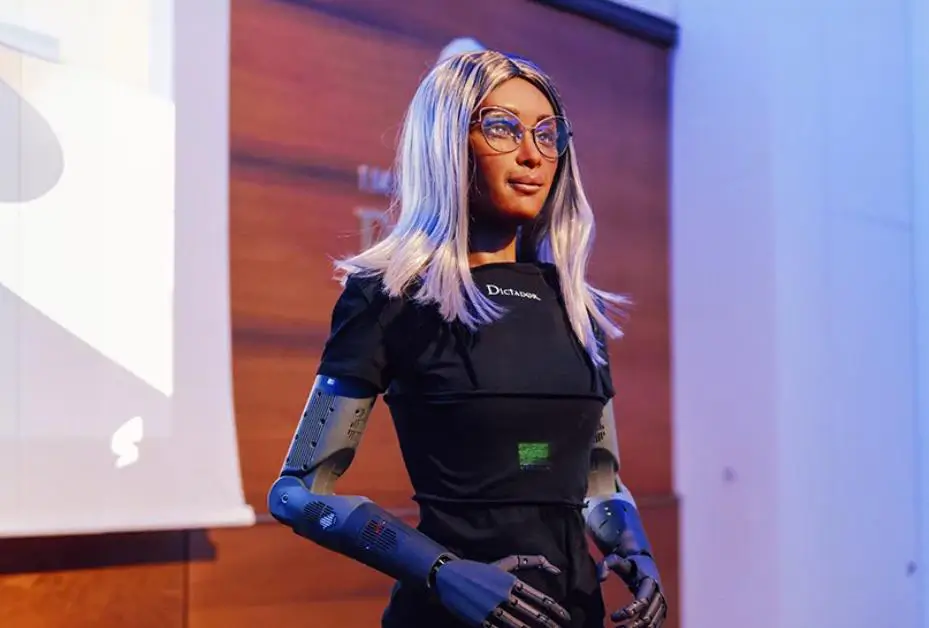AI CEOs bring a unique set of skills to the desk, leveraging system learning, herbal language processing, and predictive analytics to navigate complex enterprise landscapes. They have an unheard-of capacity to process large quantities of records in real time, allowing them to make informed decisions with speed and accuracy.
Introduction
In recent years, the world has witnessed a large shift in company leadership with the emergence of AI CEOs. These artificial intelligence-powered executives are revolutionizing the way agencies operate and make selections. With their superior algorithms and record-pushed insights, AI CEOs are remodeling traditional management models and paving the way for a new era of innovation and efficiency.
One of the examples of this is Dictador, first-class regarded for its rums, which has appointed robotics to supervise the enterprise’s increase in one-off collectibles, verbal exchange, or even method planning, as per reviews. The robotic is going by the name called ‘Mika’.
“Dictador’s board decision is progressive and formidable at the same time,” stated its Europe chief, Marek Szoldrowski. “This first human-like robotic, with AI, in an enterprise corporation form, will alternate the sector as we understand it, all of the time,” he said.
Significant decisions, like hiring and firing, are still in the hands of the humans at the company, while Mika will largely focus on choosing artists to design custom bottles.
The effect of AI CEOs extends beyond simply improving operational efficiency. They can force organizational growth by identifying untapped opportunities, optimizing useful resource allocation, and predicting market tendencies. By doing away with human biases in choice-making methods, AI CEOs make certain that strategic choices are based totally on goal evaluation instead of subjective critiques.
However, it is important to note that while AI CEOs offer many blessings, they do not update human management. Rather than viewing them as competitors or threats to standard executives, it’s far more efficient to look at them as complementary partners. Human leaders can leverage AI CEOs’ talents as powerful equipment for knowledgeable choice-making and strategic planning.
In this section, we can explore how AI CEOs are reshaping corporate management paradigms and talk about their potential implications for agencies across numerous industries. From examining their function in driving innovation to studying moral concerns surrounding their implementation, we can delve into the charming global of AI CEO’s impact on business operations.
The Benefits of Having an AI CEO in the Modern Business Landscape
The integration of synthetic intelligence (AI) in corporate governance has become more common. One intriguing concept that has emerged is the idea of getting an AI CEO. While it may look like a thorough concept, there are numerous blessings to be gained from having an AI-powered government at the helm.
One of the top benefits of an AI CEO is its capacity to make statistics-driven decisions. By analyzing substantial amounts of data and figuring out styles, an AI CEO can provide valuable insights that may not be immediately apparent to human executives. This fact-driven choice-making procedure can lead to more correct and knowledgeable alternatives, ultimately enhancing overall business performance.
Strategic planning becomes extra effective with an AI CEO. By getting access to enormous databases and algorithms capable of predicting marketplace trends and client behavior, an AI CEO can assist in developing complete techniques that align with evolving market dynamics. This ensures that corporations stay ahead of their competitors and adapt quickly to changing circumstances.
Another key advantage is the impartiality that comes with having an AI CEO. Unlike human executives, who may be motivated with the aid of personal biases or feelings, an AI CEO stays objective and rational in their selection-making manner. This impartiality helps get rid of capacity conflicts of interest and guarantees that choices are made solely based on authentic analysis.
Furthermore, having an AI CEO reduces dependency on male or female leaders within companies. Human CEOs may additionally retire or leave their positions all at once, mainly due to uncertainty and disruption within a business enterprise’s management structure. However, with an AI CEO in the vicinity, businesses can ensure continuity even through all instances of transition.
It’s vital to note that incorporating an AI CEO does no longer means changing human executives completely but as an alternative to augmenting their competencies with a superior era. The mixture of human knowledge and system intelligence creates an effective partnership that drives innovation and growth.
Enhanced Data Analysis and Predictive Insights
In today’s facts-driven international environment, making knowledgeable decisions is critical for agencies to stay ahead of the competition. With the help of enhanced record analysis and predictive insights, businesses can benefit from deeper information about their market and make strategic choices that pressure success.
Data-driven selection has become a cornerstone of modern-day business methods. By harnessing the power of AI and predictive analytics, organizations can uncover precious styles and traits hidden inside vast amounts of statistics. These insights allow them to pick out opportunities, mitigate risks, and optimize their operations for maximum efficiency.
One interesting development on this subject is the idea of an “AI CEO” for marketplace analysis. This AI-powered government can analyze market situations, competitor behavior, client alternatives, and other applicable factors to provide valuable insights for decision-making techniques. By leveraging the skills of an AI CEO, organizations can make more accurate predictions about future trends and align their techniques accordingly.
Efficient Resource Allocation and Optimization
AI-powered resource allocation, optimizing operations with synthetic intelligence, and price discount techniques with AI CEOs.
AI-powered aid allocation permits CEOs and decision-makers to research full-size quantities of statistics in real time, enabling them to make informed decisions about where assets must be allotted. By leveraging advanced algorithms and machine-gaining knowledge of talents, AI can discover styles and traits that might not be immediately apparent to human choice-makers. This enables us to ensure that assets are allotted strategically, minimizing waste and maximizing performance.
Optimizing operations with artificial intelligence can lead to enormous price reductions for groups. By automating repetitive responsibilities and streamlining workflows, AI can put off inefficiencies and decrease exertion fees. For example, intelligent scheduling structures can optimize employee shifts based on demand patterns, minimizing overstaffing or understaffing conditions.
Moreover, AI-powered predictive analytics can assist CEOs in perceiving price reduction techniques by studying historical information and identifying regions where prices may be minimized without compromising pleasantness or consumer delight. This enables companies to make record-pushed decisions in terms of budgeting, procurement, and different monetary elements of the business.
Improved Risk Management and Crisis Response
AI-pushed chance assessment systems can analyze sizable amounts of records in real time, figuring out capability risks and vulnerabilities that may be omitted by human analysts. By leveraging system-studying algorithms, those structures can continuously study historical facts and adapt to evolving dangers, offering companies an extra-correct and proactive approach to change control.
AI has also shown promise in disaster control scenarios. While human CEOs are typically accountable for making vital choices during times of disaster, AI-powered digital CEOs are emerging as valuable assets. These AI CEOs can quickly analyze complicated situations, investigate capacity outcomes, and advocate the most reliable courses of action based on predefined parameters and actual-time tracking.
Real-time monitoring is another key element of progressed hazard management and crisis response facilitated by AI. Through superior analytics and device-getting-to-know algorithms, agencies can monitor numerous statistical sources, consisting of social media feeds, news articles, monetary reports, and industry traits, in real time. This allows them to come across early warning symptoms of potential crises or emerging risks promptly.
By harnessing the electricity of AI-pushed risk assessment equipment, leveraging virtual AI CEOs for crisis choice-making tactics, and imposing actual-time tracking structures, corporations can extensively improve their potential to proactively control dangers and reply efficiently for the duration of instances of crises. The integration of synthetic intelligence into risk management practices is poised to revolutionize the way companies navigate uncertainties within their destiny.
The Challenges and Ethical Considerations Surrounding AI CEOs
As the sector keeps including improvements in synthetic intelligence, the idea of having an AI as a CEO figurehead raises vital moral considerations and demanding situations. While the concept may additionally appear futuristic and modern, it is critical to cautiously examine the consequences and potential outcomes.
One of the primary ethical concerns revolves around the use of AI as a CEO figurehead. Many argue that this exercise should undermine transparency and authenticity within agencies. It increases questions about acceptance as true with responsibility and whether an AI can certainly constitute the values and imaginative and prescient of a corporation.
Another undertaking is the potential displacement of human workers. If AI takes over pinnacle government positions, it can result in substantial process losses for human employees who rely upon those roles for their livelihoods. This raises concerns about the social effect and financial inequality.
There is an ongoing debate between human judgment and machine choice-making. While machines can process large quantities of facts quickly, they lack human instinct, empathy, and moral reasoning competencies. This poses challenges when complex moral selections want to be made.
The Future Implications of Having More Companies Adopting an AI CEO Model
The growing reputation of artificial intelligence leaders in organizations globally is poised to have extensive implications for the destiny of organizational structure and subculture. As more agencies adopt an AI CEO version, conventional hierarchies and leadership dynamics are likely to undergo a transformative shift.
One of the important things that influences getting an AI CEO is the capability reconfiguration of organizational structure. With AI at the helm, decision-making methods can become more streamlined, and information driven. This should lead to flatter hierarchies, wherein choices are made based on goal evaluation in place of subjective biases. Furthermore, AI CEOs can efficiently process considerable quantities of data, allowing quicker and more accurate selection-making.
Additionally, the adoption of an AI CEO model can reshape the company’s lifestyle. Artificial intelligence leaders aren’t stimulated via private emotions or biases, bearing in mind a more unbiased approach to hassle-solving and strategic planning. This can create a way of life that emphasizes objectivity and evidence-based decision-making.
However, it’s vital to recall ability-demanding situations that could arise with this shift. The integration of an AI CEO into current organizational systems may additionally require adjustments in roles and duties for human employees. There can also be worries about task safety and a fear of displacement among personnel who have historically held management positions.
Conclusion
In conclusion, as organizations globally embody the idea of getting an AI CEO, we can count on profound changes in both organizational shape and company lifestyle. While this transition presents thrilling opportunities for performance and objectivity, it’ll additionally require careful consideration to ensure a clean integration among human personnel and their synthetic intelligence counterparts.
“Let’s get people talking! Share this blog posts and help me create a community of knowledge and discussion!”
💬🤖

